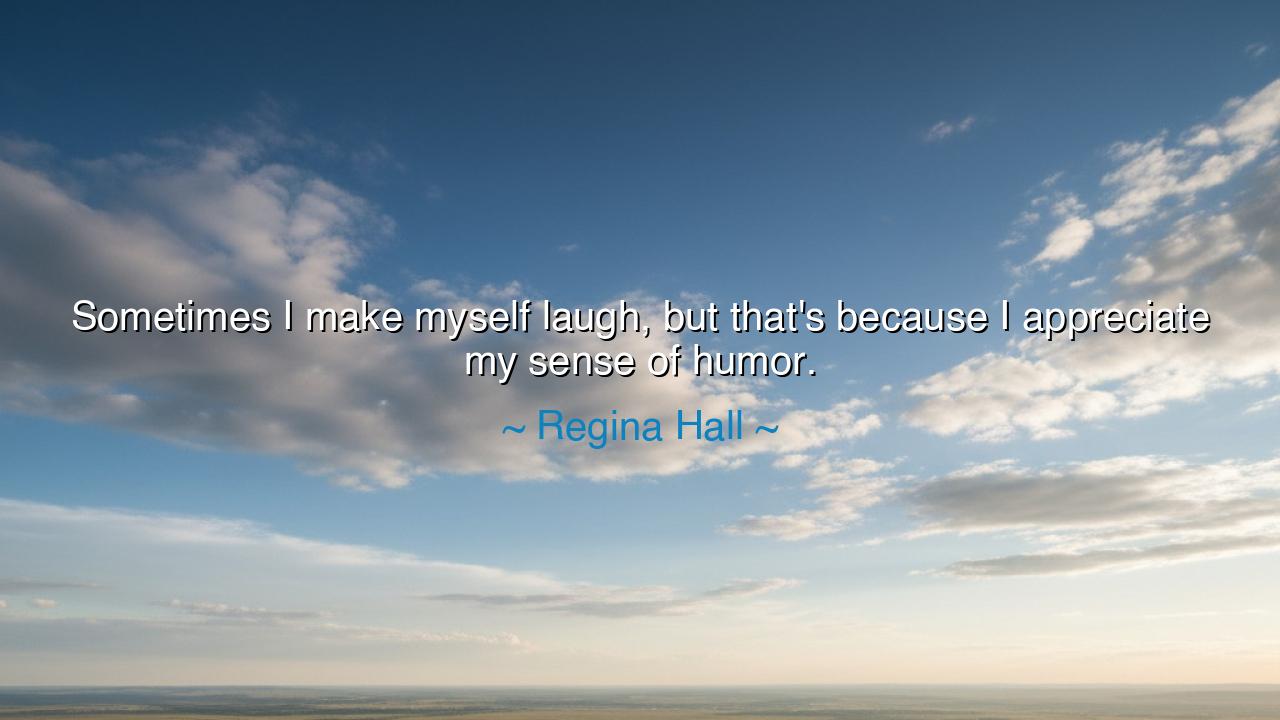
Sometimes I make myself laugh, but that's because I appreciate my






The words “Sometimes I make myself laugh, but that’s because I appreciate my sense of humor” by Regina Hall may seem playful on the surface, but within them lies a quiet and radiant wisdom — the wisdom of self-acceptance. In her laughter, Hall reveals the sacred act of embracing one’s own spirit without apology or shame. Her words are not a boast, but a celebration of the inner light that lives within every human being — the spark that can turn solitude into joy and imperfection into art. To make oneself laugh is to have discovered friendship within the soul; it is the mark of one who has learned that peace begins from within.
In the ancient world, the philosophers taught that happiness was not the reward of fortune, but the fruit of harmony within the self. To laugh at one’s own humor is to dwell in that harmony — to know one’s flaws, to witness one’s foolishness, and to love oneself nonetheless. For laughter born of self-acceptance is not arrogance; it is humility made joyful. Regina Hall, through her words, reminds us that true humor springs not from mockery, but from the courage to see the absurdity of life — and to smile at it. When we laugh at ourselves with kindness, we are not belittling the self, but freeing it.
This kind of laughter is not shallow amusement; it is a spiritual act. It is what the Stoics might have called ataraxia — serenity of the soul. The one who can find humor in their own humanity cannot be easily broken, for they have already made peace with their imperfections. When Hall says she appreciates her sense of humor, she is saying, “I honor the part of me that sees light, even when the world grows dim.” To appreciate one’s humor is to appreciate one’s resilience — the ability to find beauty and laughter even in the midst of chaos.
Consider the example of Abraham Lincoln, whose life was shadowed by tragedy and war, yet who carried humor like a lantern in the dark. He often told stories that made even his enemies laugh, and when accused of being too humorous for a statesman, he replied, “If I did not laugh, I should die.” In those words, we see the same truth Regina Hall embodies — that laughter is not weakness, but endurance. To laugh is to assert life against despair, to say, “I am still here.” Humor, when born from the heart, is a form of courage that keeps the spirit alive when reason falters.
There is also a deeper humility in Hall’s statement — the recognition that joy does not depend on others. She does not say, “Others make me laugh,” but “I make myself laugh.” This is the laughter of independence, of one who no longer waits for the world’s approval. It is the laughter of the poet who finds rhythm in solitude, the artist who delights in creation even when unseen. In this, she reminds us that self-love is not vanity, but nourishment. The soul that can laugh with itself is never truly alone, for it carries within it a wellspring of warmth and wisdom.
The ancients taught that the gods favored those who could laugh — not out of mockery, but from understanding. Laughter, when pure, is gratitude made sound. It is the music of a heart that has accepted life’s contradictions. When Regina Hall laughs at her own humor, she is performing that sacred act: she is giving thanks for the strange, imperfect miracle of being human. Her laughter is both shield and song — a way of protecting her spirit from sorrow and celebrating the beauty of existence in the same breath.
And so, dear reader, take this lesson into your own heart: learn to laugh at yourself, kindly and often. Do not wait for others to remind you of your worth. Find it in your own laughter, your own resilience, your own light. When you stumble, smile. When you fall, laugh gently, and rise again. For humor is not the denial of pain — it is the art of transforming it. As Regina Hall teaches through her simple, shining words, the one who can make themselves laugh has already mastered one of life’s greatest lessons: to find joy not in perfection, but in the beautifully imperfect self — the one that lives, learns, and laughs anyway.






AAdministratorAdministrator
Welcome, honored guests. Please leave a comment, we will respond soon